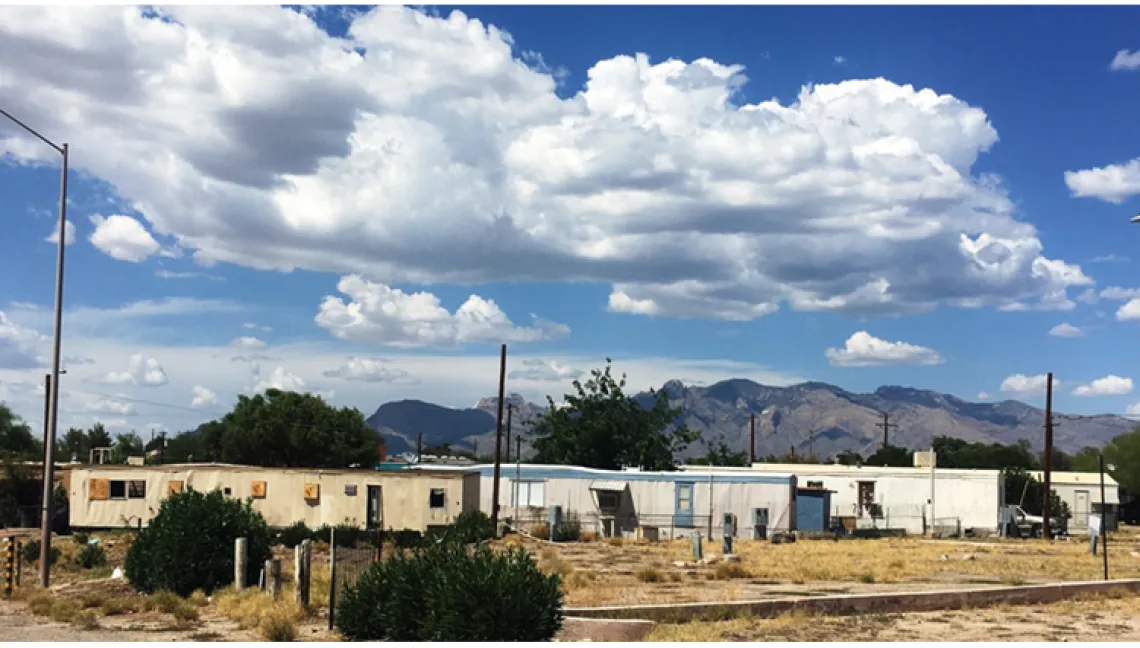Haury Program Awards Seed Grants And Fellowships

A seed grant will fund "A New Habitat for Manufactured Housing in Tucson," which hopes to create a foundation to transform Tucson’s most socially and environmentally vulnerable manufactured housing communities into healthy, sustainable and just places to live. (Photo: Mark Kear)
The Agnese Nelms Haury Program in Environment and Social Justice at the University of Arizona has announced its spring awards, which include seed grants to two teams working in Arizona and two faculty fellowships. Congratulations to Mark Kear and Margaret Wilder, both with the School of Geography and Development, whose project "A New Habitat for Manufacturing Houses in Tucson" was funded. And congratulations to Patrisia Gonzales (Mexican American Studies and American Indian Studies) and Celeste González de Bustamante (Journalism) who were named faculty fellows!
Seed Grants
The Haury program awards two to four Seed Charitable Grants each year to projects that create teams of UA and community members to seek solutions to social justice and environmental challenges. These projects must demonstrate sustainability and foster authentic relationships between the UA and the community.
The two projects selected for 2018 are:
- The two-year project "A New Habitat for Manufactured Housing in Tucson" focuses on housing for low-income families. The project’s long-term goal is to create a foundation to transform Tucson’s most socially and environmentally vulnerable manufactured housing communities into healthy, sustainable and just places to live. To do this, the team will develop indices and maps to identify Tucson’s most socially and environmentally vulnerable manufactured housing communities; recommend policy interventions to enhance quality of life and resilience in those communities; and refurbish and build new homes for a candidate manufactured housing community. Led by Mark Kear, assistant professor in the School of Geography and Development, the two-year project includes several partners: Habitat for Humanity, Ward 3 in the City of Tucson and Margaret Wilder, associate professor in the UA School of Geography and Development.
- "Engagement of Underserved Students in Biodiversity and Land-Use Issues through the Co-Management of Agriculture and Wildlife" seeks to balance the production of healthy fresh produce with wildlife habitat by taking a new approach. Yuma, Arizona, is known as the winter lettuce capital of the world. Historically, growers destroyed native habitat around their fields for food safety, assuming wildlife would leave. But studies have documented the opposite results. Traditionally underserved students at Arizona Western College will be integral to the two-year project, which can serve as a gateway for science-based agricultural careers. Led by Paula Rivadeneira, an assistant specialist at the UA Yuma Agricultural Center, the project partners with Arizona Western College and Fresh Express.
Faculty Fellowships
The Haury program selected two researchers with deep connections in Native American and Latino and Latina communities for two-year fellowships.
Patrisia Gonzales is an associate professor in the departments of Mexican American Studies and American Indian Studies in the College of Social and Behavioral Sciences. Her work will center on social justice projects that include the environment as community in cooperation with Indigenous Alliance without Borders (Alianza Indigena Sin Fronteras), an education program that links indigenous youth with elders in the organization.
“As part of this mentorship and co-exploration of knowledge, UA indigenous students will be connected to indigenous rights activists to assist Alianza elders in creating engaged public scholarship and awareness of indigenous rights regarding migration, mobility and militarized borderlands and the potential impact on indigenous knowledge,” Gonzales said.
Celeste González de Bustamante is an associate professor in the School of Journalism in the College of Social and Behavioral Sciences, where she is assistant director of faculty initiatives. Her border and cross-border research focuses on empowering underrepresented voices through research, education and community collaboration. She will work with borderlands community-based organizations to strengthen and enhance current partnerships and initiate new collaborations.
“Understanding the U.S.-Mexico borderlands and its peoples is more important now than ever. My goals and hope are that through research, teaching and by collaborating with communities on the ground, the wider public begins to better understand the borderlands,” González de Bustamante said. “Connections between the University of Arizona and the community are vital to sustainable and positive change in this critical region of the world.”
Original story here.

